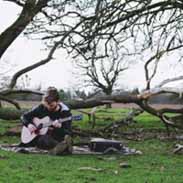Science 7th Grade – Unit 9 Biodiversity – Flashcards
Unlock all answers in this set
Unlock answersquestion
Respiration
answer
Sugar + oxygen carbon dioxide + water + energy
question
Ecology
answer
the study of the relationships between living things and their surrounds.
question
Levels of study (from most inclusive to least inclusive)
answer
biosphere, ecosystem, community, population, organism
question
Biosphere
answer
zone of air, land and water of the planet that is occupied by organisms
question
Ecosystem
answer
all living (biotic) and nonliving (abiotic) things in a designated area
question
Community
answer
all the living organisms in an ecosystem
question
Population
answer
the number of individuals of a one species within a community
question
Organism
answer
an individual member of a species
question
Habitats
answer
ecological or environmental areas that are inhabited by a particular species of animal, plant or other type of organism. This is synonymous to an animal's "address".
question
microhabitat
answer
a specialized habitat such as a clump of grass or a space between rocks.
question
niche
answer
the role that an animal plays in its habitat. Synonymous to an animal's "job".
question
biome
answer
a division of the world's vegetation that corresponds to a defined climate and is characterized by specific types of plants and animals.
question
terrestrial biomes
answer
land biomes
question
aquatic biomes
answer
water biomes
question
Tundra biomes
answer
with only simple plants such as lichen and arctic animals. The least sustainable biome due to little biodiversity. (frozen permafrost)
question
Taiga biomes
answer
coniferous forest (trees whose seeds are cones - evergreens)
question
Deciduous forest
answer
trees that drop their leaves annually (have 4 seasons)
question
Tropical forest
answer
wet and warm, poor soil, most biologically diverse
question
Desert
answer
dry with very thin, sandy or gravelly soil, species must cope with the heat and cold.
question
Saltwater Oceans
answer
saltwater environment with abundant forms of life and lots of biodiversity
question
Grasslands
answer
land covered in grasses, small shrubs, and few large trees
question
Biodiversity
answer
known as the "variety of life", and it is always changing. (species diversity). The greater the richness and species numbers, the more sustainable (lasting) the ecosystem.
question
Organisms affected by other organisms
answer
symbiosis, mutualism, commensalism, parasitism
question
Symbiosis
answer
describes close and often long-term interactions between different biological species
question
Mutualism
answer
a dependent relationship that benefits both organisms
question
Commensalism
answer
a dependent relationship that neither helps nor harms the host.
question
Parasitism
answer
a dependent relationship that harms the host
question
Ecological Succession
answer
more-or-less predictable and orderly changes in the composition or structure of an ecological community.
question
Primary succession
answer
the area will begin from bare rock
question
Secondary succession
answer
the soil will already be developed
question
Pioneer species
answer
the first species that inhabit an area (examples include lichens and moss). These plants, along with wind and weather, help break down the rocks into smaller pieces and organic matter gradually accumulates.
question
Examples of pioneer species in secondary succession
answer
grasses, weeds and wildflowers
question
Intermediate species
answer
begin to form when the soil is rich enough and deep enough to support larger species of plants (which in turn provide animals species with varied shelters). This includes bushes and shrubs.
question
Climax communities
answer
ecosystems that have reached equilibrium (a stable state where very few large changes are taking place). They remain relatively stable unless disturbed by man or Mother Nature.
question
Examples of things in climax communities
answer
Large plants such as trees as well as other species that can continue to compete in a more complex ecosystem.
question
Invasive species
answer
affect ecosystems and are more successful than the native plants for a several reasons. (example: weeds)
question
Reasons invasive species are more successful
answer
1) better competitors for resources 2) faster growth rates 3) greater seed dispersal abilities 4) better colonizers of disturbed ground 5)reproduce quicker and produce more seeds 6)greater tolerance to environmental extremes 7) lower rate of disease



